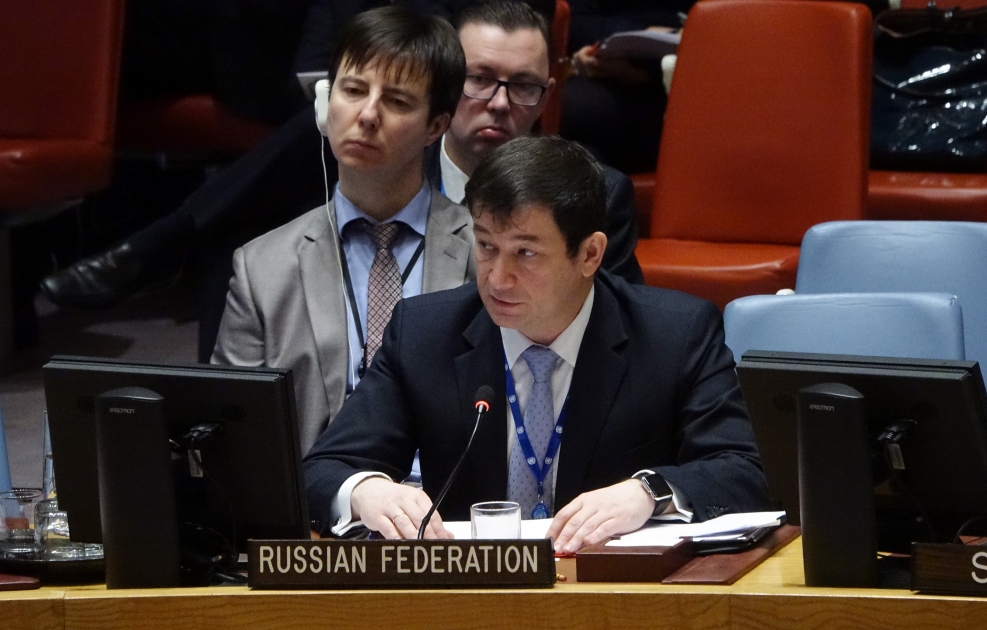Statement by Mr.Dmitry Polyansky, First Deputy Permanent Representative of the Russian Federation to the United Nations, at the Security Council on the situation in Myanmar
We are grateful to Mr. Miroslav Jenča, Assistant Secretary-General for Political Affairs, and Mr. Filippo Grandi, United Nations High Commissioner for Refugees, for their substantive briefings.
The complex, multifaceted topics they touched on require a painstaking and consistent approach on the part of the international community and thorough and impartial study by experts. Any labelling or attempts to use contradictory and subjective media reports, often hastily put together, to identify the guilty and condemn them only make it harder for us to arrive at a solution.
In our opinion, the situation in the Rakhine national region, including its northern areas adjacent to Bangladesh, remains difficult but in general under control. The Myanmar authorities’ planned social and economic development efforts there have in large part contributed to that, and steps are being taken to create special economic zones in the region. In the town of Maungdaw, in particular, the central market, which has more than 400 trade outlets, has reopened, and 16 closed-circuit television cameras have been installed for security and monitoring purposes.
It is important to note that the central and regional authorities are prioritizing housing construction and modernization of road and transport infrastructure. In northern Rakhine, one transit and two reception centres for receiving refugees have been built, with 640 shelters that can provide temporary housing for more than 30,000 refugees.
Regarding the international community attention to the efforts in Naypyidaw to implement the recommendations of the Advisory Commission led by Kofi Annan, we commend the work of the group of advisers under the Myanmar ministerial committee led by Thailand’s former Deputy Prime Minister and Minister for Foreign Affairs Surakiart Sathirathai.
The expanded access to Rakhine state being granted to foreign observers is a positive step. In particular, a number of groups of journalists have visited the region in recent weeks, including employees of Russian television. On 6 February, representatives of neighbouring states visited Rakhine, and the authorities organized a similar trip for representatives of the local diplomatic corps on 9 February. They visited the Kanyin Chaung economic zone and Ngakunya settlement, as well as refugee transit and reception camps. An inspection of the border zone was even arranged for the first of those groups.
The situation regarding the repatriation of refugees continues to be very difficult, but we see some positive signs there too. We note the steps taken by Naypyidaw and Dhaka to implement their agreement, signed on 23 November 2017, on a programme for the return of persons displaced from Rakhine, including the convening on 15 and 16 January of the first meeting of the bilateral working group and its adoption of a plan for the return of Muslims who have fled to Bangladesh. In our view, the document has laid a foundation for solving the most difficult issues related to refugees’ repatriation to Myanmar.
We believe that in the current circumstances it is important to facilitate a resolution of the Rakhine situation, focusing on practical assistance to the Governments of Myanmar and Bangladesh in a spirit of equality and mutual respect. We would like to emphasize that the Myanmar refugee situation is a issue of bilateral relations between Myanmar and Bangladesh that should be resolved through appropriate consultations.
We realize that the Dhaka authorities are bearing a tremendous burden with regard to hosting and sheltering this huge number of refugees on their territory, one beyond the capacities of any single country, and the international community must therefore provide Bangladesh with all the support it needs in this area.
However, we are very concerned about the attempts to delay a resolution of the repatriation issue on the pretext that Myanmar lacks the conditions for the safe, dignified and sustainable return and resettlement of repatriates. Needless to say, their living conditions must comply with humanitarian standards, but the arguments of those who are creating artificial obstacles to the process and inciting refugees by fuelling their anxiety are unacceptable.
We will continue to urge all the parties to refrain from violence, emphasize the importance of respecting Myanmar’s sovereignty and work to resolve the multilayered and complex problems in Rakhine by exclusively political means, through a dialogue between Naypyidaw and Dhaka and between representatives of all nationalities and faiths.
